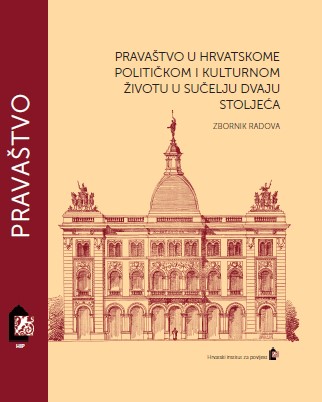O okolnostima osnutka i djelovanju Kluba Starčevićeve hrvatske čiste stranke prava u Sarajevu
On the circumstances of the formation and activity of the Club of Starčević’s Croatian Party of Pure Right in Sarajevo
Author(s): Zoran Grijak
Subject(s): Local History / Microhistory, Political history, Government/Political systems, Political behavior, Pre-WW I & WW I (1900 -1919)
Published by: Hrvatski institut za povijest
Keywords: Austro-Hungarian Monarchy; Bosnia and Hercegovina; First World War; ‘Rightism’; the Club of Starčević’s Croatian Party of Pure Right; May Declaration; Stjepan Sarkotić; Ivo Pilar;
Summary/Abstract: On the basis of archival sources this article analyzes the circumstances surrounding the formation of the Club of Starčević’s Croatian Party of Pure Right in Sarajevo (1909), and especially the activity of its prominent members and adherents during the First World War. On the basis of memoranda directed to Emperor and King Charles I (IV) the activities of the members and supporters of the Club are analyzed. During the war the ‘Rightists’ of Bosnia-Hercegovina were in favour of a reconstitution of the Austro-Hungarian Monarchy on a Trialist, or Sub-Dualist, basis in order to create a whole Croatian state within its framework to which Bosnia and Hercegovina would be joined. In the twilight of the Monarchy this initiative was reconfigured toward a federalist model of the Monarchy’s reorganization in the belief that the victorious Entente, should it choose to preserve the Monarchy, would insist on its reorganization as a federal state based on the self-determination of nations. Likewise the ideas of the Bosnian and Hercegovinian Serbs and Muslims concerning the constitutional reorganization of the Monarchy are analyzed, wherein the Serbian notions for the most part were in line with the program of the so-called May Declaration of the Yugoslavian Club of the Imperial Council (1917), while the majority of the Muslims called for an autonomous Bosnia and Hercegovina within the framework of the Monarchy. At the same time the author points out that most of the Croatian politicians in Bosnia and Hercegovina supported the May Declaration and worked toward the restoration of the Bosnian and Hercegovinian Sabor (Parliament). On the basis of an analysis of the attitude of the leading political representatives of the two ruling nations of the Dualist Monarchy, the Austrian Germans and the Hungarians, toward the above mentioned attempts, it is clear that they were not considering a revision of the Dualist system, rather, they were hoping to strengthen it on the basis of a kind of sub-Dualism with the inclusion of Serbia and Montenegro within the Monarchy. At the same time the Hungarians continued to try to attach Bosnia and Hercegovina to the Hungarian part of the Monarchy as a corpus separatum. The author directs attention to the resistance of Croatian political leaders in Bosnia and Hercegovina to the efforts to bring Serbia and Montenegro within the framework of the Monarchy, because they felt that any increase in the number of Serbs within the framework of Croatia and Monarchy was in the long-term perspective a threat to their survival.
Book: Pravaštvo u hrvatskome političkom i kulturnom životu u sučelju dvaju stoljeća
- Page Range: 175-263
- Page Count: 89
- Publication Year: 2013
- Language: Croatian
- Content File-PDF

